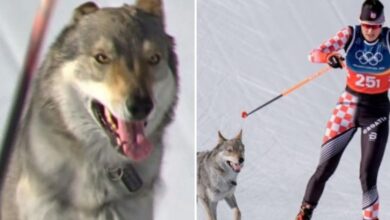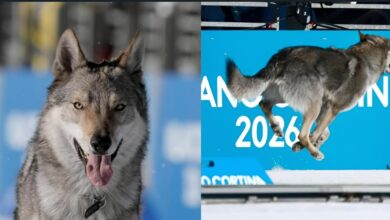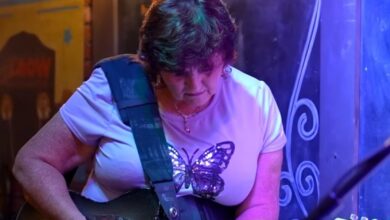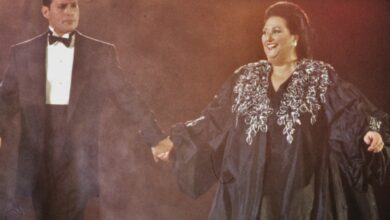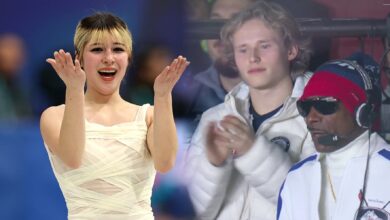Ace Frehley’s Triumphant “Shock Me” Solo at KISS’s 1996 Detroit Reunion — The Night the Spaceman Set the Sky on Fire
The night Detroit’s Tiger Stadium roared back to life in full greasepaint started like a controlled detonation: a sellout crowd, the smell of pyros hanging in warm summer air, and four silhouettes rising in slow, theatrical triumph. It was June 28, 1996, opening night of the Alive Worldwide Reunion Tour, and the original KISS—Paul Stanley, Gene Simmons, Peter Criss, and Ace Frehley—had come to prove that spectacle and muscle memory still counted for something. Stadium lights dimmed to a tungsten glow, the house PA spat fire, and those first crunching chords felt less like a beginning than a resurrection. Fans who grew up with posters on their bedroom walls suddenly had the living, towering version in front of them, bigger, louder, and far less myth than they once imagined, yet somehow more mythic still.
What made the staging so potent wasn’t just the props—the gargantuan logo, the gouts of flame, the hydraulic risers—but the deliberate pacing. KISS understood narrative, and they spent the first third of the set reminding the stadium how their catalog could thread swagger and chant-along hooks into a single, stadium-ready braid. “Deuce” as a calling card, “King of the Night Time World” as a thesis statement, “Calling Dr. Love” as a grin and a wink—every transition tightened the oxygen in the bowl. The band moved like veterans who’d rehearsed not to be perfect, but to feel inevitable, letting the rhythm section’s thump leave footprints in the outfield.
Even the way the cameras hunted the stage felt curated. Wide shots lingered on the logo, then snapped to close-ups of Simmons’ bass prowl or Stanley’s come-on grin, before cutting to Frehley—expression unreadable behind the Spaceman paint, hands fluttering across the fretboard like he was tuning an engine mid-flight. The stadium swallowed the sound and belched it back twice as large, and you could sense the crowd syncing with the show’s adrenal tempo. It was theatricality as a trust exercise: fans suspended disbelief, and the band made good on the faith with riffs, lights, and a perfectly timed kaboom.
Detroit wasn’t merely another booking on a route map; it was the launch pad. Announced months earlier with the kind of flourish only KISS could justify, the reunion had been hyped as a restoration of the classic lineup’s superpowers. Expectations can crush a veteran act; here, they served as rocket fuel. The band entered with the confidence of a legacy intact, aware that nostalgia would get people in the door, but precision and pressure would keep them howling until the last confetti strand hit grass. If the ‘70s had been the band’s wild adolescence, this was their seasoned adulthood—wiser about pacing, cannier about spotlight management, and sharper about giving each member a chapter in the larger story.
By the middle portion of the show, the setlist began to shape-shift from crowd-pleasing momentum to individual showcases, and the stadium’s sound seemed to narrow from a hurricane to a focused beam. That’s the moment when “Shock Me” started to flicker on the horizon—KISS historians know the telltale sequencing by heart. Stanley’s mic banter eased, Simmons stalked to the wings, and a familiar hum—equal parts guitar and anticipation—moved through the stands like a weather front. Even without seeing the printed setlist, long-timers could feel what was coming: Ace’s turn to take the oxygen and turn it to plasma.
“Shock Me” arrived not as a period, but a comma with neon edges. Frehley’s tone cracked with that dry, unmistakable bark—Marshall thunder, crisp top bite—and his phrasing swung between alley-cat lazy and cobra-quick. What makes a stadium solo land is not merely speed; it’s silhouette. Ace’s lines drew shapes in the air you could almost trace with your finger: a lean here, a slide there, a blues curl that turned into a sudden knife-stab of notes. The song’s vocal gave way, and the solo space opened like a garage door on a hot night. The crowd didn’t so much cheer as combust, as if each bend and pickup switch were a spark to tinder soaked in memory.
The production exaggerated the drama with a magician’s sense of flourish. Smoke coiled low around his boots, lights strobed in argent pulses that made his chrome-and-silver Spaceman armor look like moving sculpture, and the camera found the angle where guitar and constellations seemed to meet. That was always Ace’s trick at his best: making the technical look casual, the casual look cosmic. He’d throw his shoulder into a run, glance at the neck as though surprised, then peel off another phrase with that Bronx-born looseness, equal parts street and stardust. If you wanted tidy arpeggios, you looked elsewhere; if you wanted feel that grinned and then took flight, you were exactly where you needed to be.
Then the centerpiece: the dedicated guitar-solo runway after “Shock Me,” vintage KISS architecture. Frehley stepped into that blank canvas the way a graffiti artist eyes a fresh wall—intent on making something loud, permanent, and undeniably his. Whammy dips rubbed shoulders with feedback blooms; harmonics pinged like pinballs; and his melodic fragments stitched themselves into a through-line that felt improvised but landed with narrative logic. The best solos work like a monologue—you stop counting measures and start listening for meaning—and in that moment Ace spoke fluent, amplified autobiography: defiance, humor, a little chaos, plenty of charm.
What made the stadium gasp wasn’t pyrotechnics alone (although, yes, there were pyrotechnics) but the sense of time collapsing. Fans who’d first discovered KISS on battered vinyl suddenly felt a youthful voltage in their ribs again. Newer listeners, raised on the band’s mythology, got to witness the origin story performed by its originators. Frehley played not as a museum piece dusted off for a gala, but as a live-wire artist feeding on scale—his phrasing growing taller simply because the walls around him were so far away. Stadiums are ruthless to nuance; the greats learn to make nuance bigger. Ace did, and the outfield bleachers understood every word.
If you mapped the show like a novel, that solo was the plot twist where motive becomes unmistakable. The reunion wasn’t about nostalgia alone; it was about reclaiming authorship. Simmons’ menace and Stanley’s showman poise were vital chapters, but Frehley’s voice—equal parts comic-book rocket and blues-bar scrape—was the line that underlined the thesis. When he hit the final cascade and let the guitar moan out a last, sweet complaint, you could hear the stadium’s cheer turn from delight to gratitude. It’s the sound a crowd makes when it realizes it has gotten precisely what it came for, plus a little extra it didn’t know it needed.
From a historian’s point of view, Detroit’s opener also set a data point: the canonical sequence where “Shock Me” anchors the mid-set surge and unlocks Ace’s spotlight. It is telling that so many bootlegs and later retrospectives reach for this very night when they want to show the reunion’s promise fulfilled in a single, blazing artifact. The paper trail—song-by-song, city-by-city—keeps pointing back to Tiger Stadium as the place where the reunion’s thesis became proof.
Context matters, too. The official kickoff framed the months that followed as a victory lap without becoming complacent. Press accounts and retrospectives would later note how the band, newly reassembled in full makeup, moved from curiosity to juggernaut in the space of a single summer. The machine around them—merch, promotion, relentless routing—was formidable, but it’s the image of Ace in silver, carving his initials into humid night air with a Les Paul, that remains the poster in the collective memory. This is the shot you think of when someone says “Reunion Tour,” the one that explains the ticket stubs you kept.
The poignancy of revisiting that performance in 2025 now lands with a different weight. Ace Frehley—founding member, architect of so many of the band’s indelible guitar moments—has died at 74, following injuries related to a fall. Obituaries from major outlets read like a chorus: the Spaceman who married streetwise feel to sci-fi showmanship, the Bronx kid who turned a bolt of lightning into a persona, the guitarist whose solo album out-charted his bandmates’ in 1978, the icon who made “Shock Me” a rite rather than a song. In the flood of remembrance, Detroit ’96 keeps coming up, as if the night were a capsule labeled “why he mattered.”
There’s a practical reason that image endures: documentation. Setlists, ticket scans, fan-shot footage, and later official releases make Tiger Stadium unusually visible for a mid-’90s rock show. You can triangulate details—lighting cues, pyro accents, the way the camera crane swoops during the solo—and line them up with contemporary reviews and fan journals. The composite picture is unusually crisp: a band freshly reunited, a city that understands loud, and a guitarist savoring the oxygen of a second act. For researchers and casual fans alike, it’s a reliable address to send your nostalgia when you want it signed on receipt.
In the days after Ace’s passing, officials in New Jersey noted that additional testing would clarify specifics around cause of death, a reminder of how public figures remain public even in their most private hour. Yet the tone of the tributes—bandmates, peers, and legions of fans—has not been forensic but grateful. They talk about tone, about feel, about the way he could take a simple pentatonic idea and make it grin, then snarl, then lift off. They share clips of that Detroit solo the way friends pass around old polaroids, each recounting where they were when the sparks rained and the note sustained just a fraction longer than physics should allow.
What the reunion’s opener captured, better than any press kit could, was Ace’s gift for showmanship that never smothered the music. The smoke, the lights, the shoulder roll, the eyes he’d make at the audience—those were the brushstrokes, not the painting. The painting was that ragged, singing vibrato; the way he’d let a note hang until it started to fray at the edges; the sly rhythmic push that made a simple lick dance. In a stadium, subtle gestures die quickly; Ace learned to make subtlety legible at 120 yards without sanding off its edges.
There’s an honesty to the “Shock Me” solo that helps explain why its memory is so durable. It doesn’t aim to be the most complex passage you’ll hear; it aims to feel inevitable once you’ve heard it. That’s the mark of a voice rather than a vocabulary. In Detroit, with the reunion’s hype howling and the cameras hungry, Ace chose personality over perfection and ended up with something close to perfect because of it. When the final figure snapped into place and the band crashed back in, the stadium’s cheer sounded like relief: this is what it’s supposed to be.
It’s fashionable to speak of eras closing, but what the Tiger Stadium footage teaches is that eras can fold into one another if the right hands are on the wheel. The ‘70s swagger, the ‘90s scale, the 21st-century archival life—all three live inside that solo now. You can stream it on a phone and still feel the fireworks, or you can close your eyes and hear the pick-scrape skitter across steel and memory. If you need a single artifact to explain why KISS mattered as a live experience, you could do worse than point to Ace under those lights, turning noise into a signature with every bend.
And so the reunion’s starting pistol doubles, in hindsight, as a toast. To Ace’s tone, to the band’s commitment to theater, to the discipline of building a set like a narrative arc, to the mid-set moment where a guitarist steps into a spotlight and proves that charisma is a musical parameter. The outfield grass has long since been replaced, the confetti swept, the rigging folded and hauled, but that solo still rattles around the rafters of anyone who was there—or has watched enough times to feel like they were. On that hot Detroit night, the Spaceman didn’t just play to a stadium; he plugged an entire history into an amp and let it sing.
